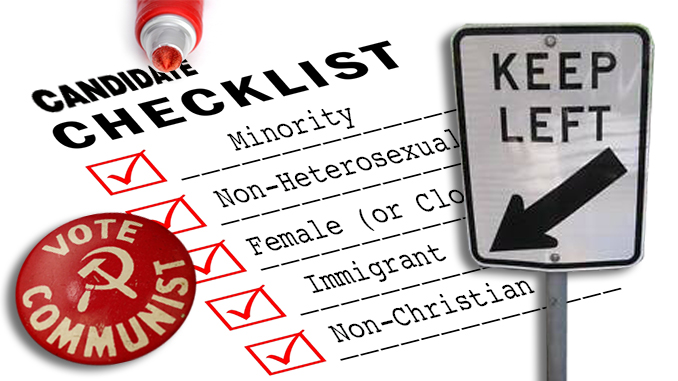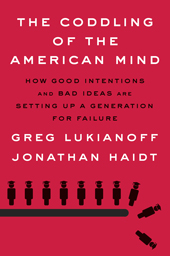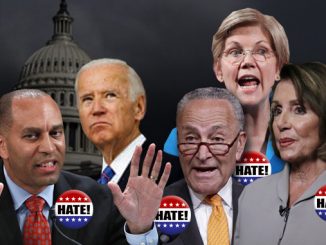
What is “intersectionality,” and why is so important to the brainwashed left-leaning voter?
By S.T. Patrick
Trying to decipher what makes a Democratic nominee for president viable enough has become as difficult as correctly keeping the official scorebook for a slugfest in baseball. The intraparty debate over Indiana Mayor Pete Buttigieg has not centered on Buttigieg’s lack of political experience, being bereft of legislative accomplishments, or the near-impossibility of making a jump from the mayor’s office to the Oval Office. After all, that leap was something even “America’s Mayor” Rudy Giuliani couldn’t do after 9/11 catapulted him to political superstardom. Buttigieg’s challenge within his own party is a little-known yet perplexing labeling philosophy called “intersectionality.”
Intersectionality is the idea that the sum of a candidate’s “diversity factors” adds a maximum value to an ideal candidate, one a “New Democrat” can support. Therefore, a Hispanic male (one diversity factor, being Hispanic) isn’t as valuable or viable a candidate as a black female (two diversity factors, being black and female). A black, gay, disabled female would have a theoretical score of four. The Daily Caller’s Celine Ryan calls them “victim points.”
If this seems as politically manic as it does logically ridiculous, that’s because it is. Intersectionality is full of holes, even when argued vociferously by those who adhere to it most. High political positions have often been battles of the monied class, but Americans, in their collective hearts, still believe that voting should be a meritocracy. The positions should be earned by demonstrating a history of successful experiences. Intersectionality devalues a candidate’s literal experiences and instead judges a candidate by demographic factors.
Though being a mayor of a midwestern American college town such as South Bend (home to the University of Notre Dame) hardly seems the typical path to the presidency for a Democrat, Buttigieg is attractive to the Democratic Party as an openly homosexual candidate. The problem for some left-wing pundits is that he also has a high WASP-y factor. He is a white male who also openly professes a devotion to his Christian faith.
In a discussion at this year’s South by Southwest festival in Austin, Texas, Buttigieg admitted that he has also felt the “white male privilege.” He recalled a time when he was caught with marijuana and not arrested. The lack of arrest is something he attributes directly to his gender and his race working in harmony to produce a lack of prosecution.
Questions arise the moment the informal scoring process begins. How will the Democratic Party weigh each factor? Does a candidate’s gender weigh more or less than their race? Does a candidate’s race weigh more or less than their sexuality? Are all demographic factors equal?
In an op-ed for The Atlantic, Lucas Grindley dismissed many of Buttigieg’s personal accomplishments, such as speaking eight languages, some of which could be politically valuable. Grindley cares about one factor: “But as a gay man, I do care that Buttigieg is gay,” Grindley wrote. Grindley believes that it is demographic factors that will determine a politician’s ability to solve problems, not having some ability to work with a friendly, divided, or hostile legislature.
“These facets of their identities mean that they can understand the powerless, as victims of power, and that they can understand the alienated, having been marginalized,” Grindley wrote.

Therefore, for Grindley, Buttigieg’s sexuality is as important or more important than Sen. Cory Booker’s race, the gender of Rep. Tulsi Gabbard, the confused heritage of Sen. Elizabeth Warren, or the religion of Rep. Ilhan Omar, if she were to ever seek higher office. Why? Because that’s what he personally values and because it’s the factor with which he most identifies. It’s a mindset not uncommon among millennials. “Right,” “good,” and “valuable” are determined by whatever they choose to be or believe, not by what may benefit a majority of the Americans most. The most rabid defenders of intersectionality within the Democratic Party do poll younger.
If it seems like Buttigieg’s views on public policy have not had a proper airing, they haven’t, and they may not get one. Even when debate season begins, expect the Democratic candidates to focus largely on their own niche (their intersectional “wins”). If this is the case, the door is wide open for Republican candidates to win a battle of ideas. That battle will be the high road, whereas the low road, being dragged into a fight over cultural norms, will only allow Democrats to reinforce tired stereotypes about “out-of-touch” Republicans.
Republicans should let Democrats argue over which candidate is a better recycler, or which candidate is nicer to geese, or whether a candidate empathizes enough with a self-professed victim of human nature. Intersectionality will survive because its fringe supporters care about or know little else. But with an aging American tax base watching those same debates, expect intersectional “winners” to also be exposed as corporate, pro-war Democratic emperors in new clothes.
S. T. Patrick holds degrees in both journalism and social studies education. He spent ten years as an educator and now hosts the “Midnight Writer News Show.” His email is [email protected].




